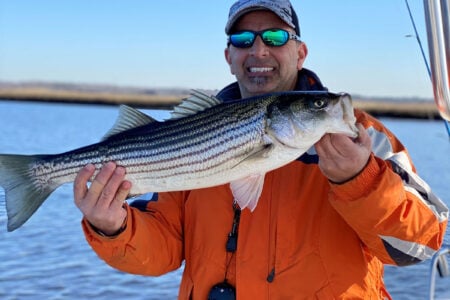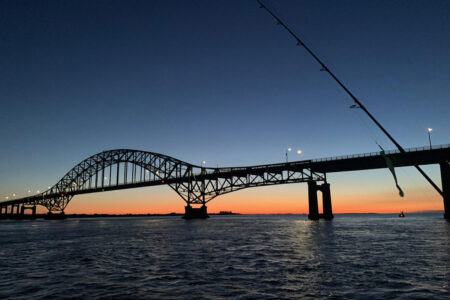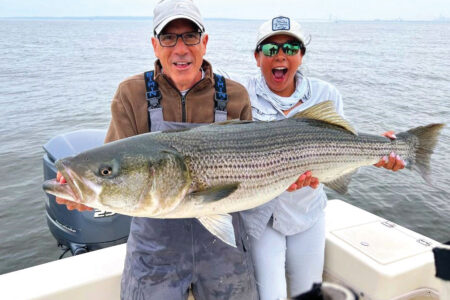As with anything striped bass related, this has the potential to get heated. There is simply something about the striped bass that gets its legions of devotees fired up. Whether imagery of wasteful discards, boat decks covered in fish or word of yet another poacher getting caught, there is no denying the power of this fish to move people to take action.
Massachusetts and Rhode Island are the only remaining states in New England that still have a commercial road-and-reel fishery. To our immediate south, New York also allows for both rod-and-reel as well as gillnetting of striped bass.
Many anglers feel that the commercial fishery coupled with the black market/poaching is the reason for the current state of the striped bass stocks. If you remember back in 2014, the ASMFC’s Atlantic Striped Bass Management Board submitted Draft Addendum IV to Amendment 6 to the Interstate Fishery Management Plan for Atlantic Striped Bass. It was subsequently approved in October of that year and was in response to results of the 2013 Atlantic striped bass benchmark assessment indicating fishing mortality (F) target, and female spawning stock biomass (SSB) had been steadily declining below the target since 2006. This meant that even though the stock was not overfished and overfishing was not occurring, SSB was approaching its overfished threshold and stock projections showed SSB would likely fall below the threshold in the coming years. In addition, a similar decline had been observed in total harvest. This resulted in the reduction of the recreational daily bag limit on striped bass from two fish to one per angler, and the reduction in commercial quotas coast-wide by 25%.
But was this enough? While I say that without question it is far too early to say for sure, things are apparently on the right track and there were those who were quick to jump at the opportunity to liberalize the regulations. Back in February, 2017, by way of a press release from the ASMFC it was announced that, “The Commission’s Atlantic Striped Bass Management Board initiated the development of Draft Addendum V to Amendment 6 to the Atlantic Striped Bass Fishery Management Plan (FMP) to consider liberalizing coastwide commercial and recreational regulations. The Board’s action responds to concerns raised by Chesapeake Bay jurisdictions regarding continued economic hardship endured by its stakeholders since the implementation of Addendum IV and information from the 2016 assessment update indicating fishing mortality is below the target.
According to the results of the 2016 stock assessment update, the Atlantic striped bass stock is not overfished and overfishing is not occurring. Furthermore, Addendum IV successfully reduced fishing mortality to a level below the target (F in 2015 is estimated at 0.16), and length‐frequency data from the catch in 2015 indicates a strong presence of the 2011 year class which is anticipated to join the coastal spawning population this year.”
Fortunately for those such as myself who feel it is best to err on the side of caution before acting too quickly to change regulations, a subsequent press release was issued in May 2017 which stated, “The Commission’s Atlantic Striped Bass Management Board chose to not advance Draft Addendum V to Amendment 6 to the Fishery Management Plan (FMP) for Atlantic Striped Bass forward for public comment. Instead, it decided to wait until the release of the results of the 2018 benchmark stock assessment before it considered making changes to the management program.”
Okay, back to my original point here. Two Massachusetts representatives, Rep. Walter Timilty (D-Milton) and Rep. Thomas Stanley (D-Waltham), have filed a set of proposals which, if eventually passed, would reduce and eventually eliminate commercial rod-and-reel fishing for striped bass in Massachusetts as well as increase the fines for violators of new regulations. It is worth noting that these proposals have been filed in the past.
Mr. Stanley’s first proposal (Bill H.465 https://malegislature.gov/Bills/190/H465/BillHistory) is to form, “… a special commission (including members of the General Court) relative to the status of wild striped bass in the Commonwealth. Environment, Natural Resources and Agriculture.
The commission shall examine and assess the impact that commercial harvesting and recreational fishing have on the population and viability of wild striped bass in the Commonwealth, the economic value of the recreational striped bass fishery in terms of tax revenue and jobs, and state and local tax revenue loss due to the decline of the recreational fishery.”
In Mr. Stanley’s second bill (Bill H.466 https://malegislature.gov/Bills/190/H466), he proposes that, “Commercial harvesting and sale of wild striped bass shall be permitted for individuals owning commercial licenses on December 31, 2012 who can historically demonstrate over the preceding 5 years that they have averaged an annual landing and sale of more than 1000 pounds of striped bass based on records made available to the Massachusetts Division of Marine fisheries.
Notwithstanding any special or general law to the contrary, the issuing of commercial striped bass licenses shall cease as of January 1, 2025.”
It goes on to attempt to curtail poaching and black market sales of striped bass by stating, “Whoever violates any rules or regulations made pursuant to this section shall be punished by a fine of not less than $200 for each fish taken or possessed for the first violation, five hundred dollars for each fish taken or possessed for the second violation and for each subsequent violation shall be fined one thousand dollars for each fish taken or possessed or imprisoned not more than sixty days or both. No part of any fine imposed for the taking or possession of any striped bass in violation of any such regulation shall be remitted.”
In the proposal filed by Rep. Walter Timilty (Bill S.492 https://malegislature.gov/Bills/190/S492), “Commercial harvesting and sale of wild striped bass shall be permitted for individuals owning commercial licenses on December 31, 2012 who can historically demonstrate over the preceding 5 years that they have averaged an annual landing and sale of more than 1000 pounds of striped bass based on records made available to the Massachusetts Division of Marine fisheries.
Notwithstanding any special or general law to the contrary, the issuing of commercial striped bass licenses shall cease as of January 1, 2025.”
It too seeks to reduce poaching and black market sale of striped bass: “Whoever violates any rules or regulations made pursuant to this section shall be punished by a fine of not less than $200 for each fish taken or possessed for the first violation, five hundred dollars for each fish taken or possessed for the second violation and for each subsequent violation shall be fined one thousand dollars for each fish taken or possessed or imprisoned not more than sixty days or both. No part of any fine imposed for the taking or possession of any striped bass in violation of any such regulation shall be remitted.”
If the proposals to limit commercial fishing or increase fines for poaching are to move forward, there will no doubt be some extremely heated debates and public hearings to follow. Stay tuned and we will be sure to pass along word of this issue as it develops.



